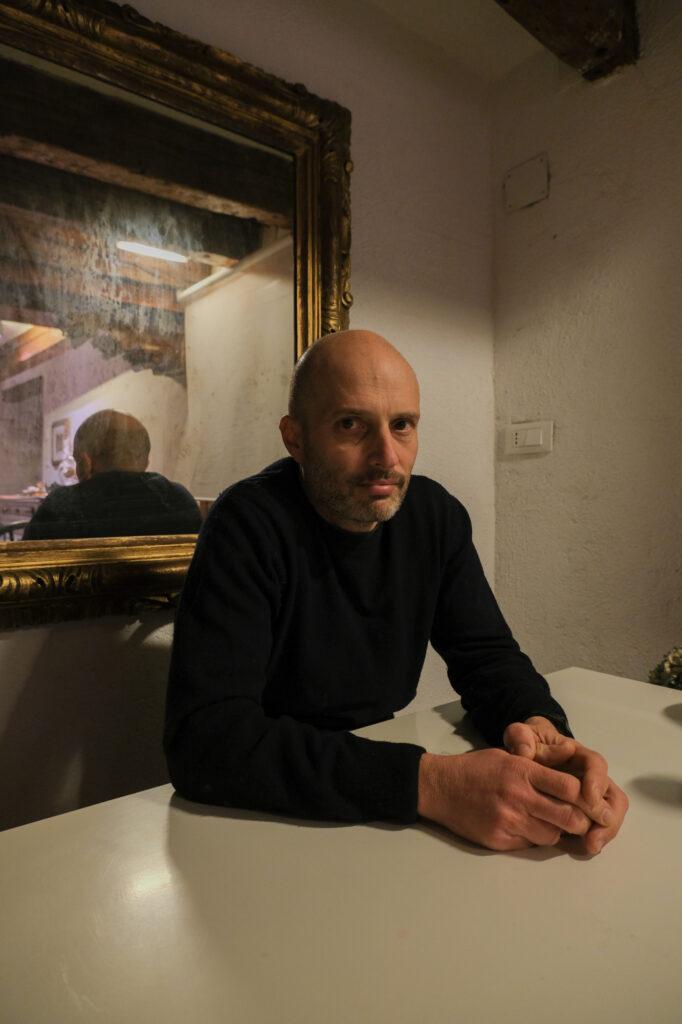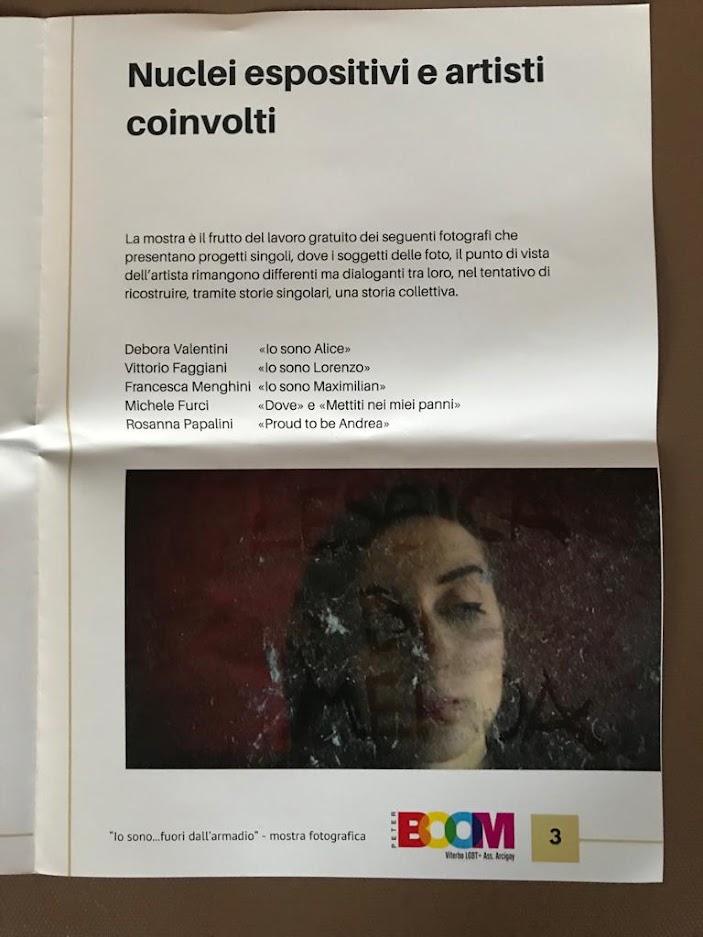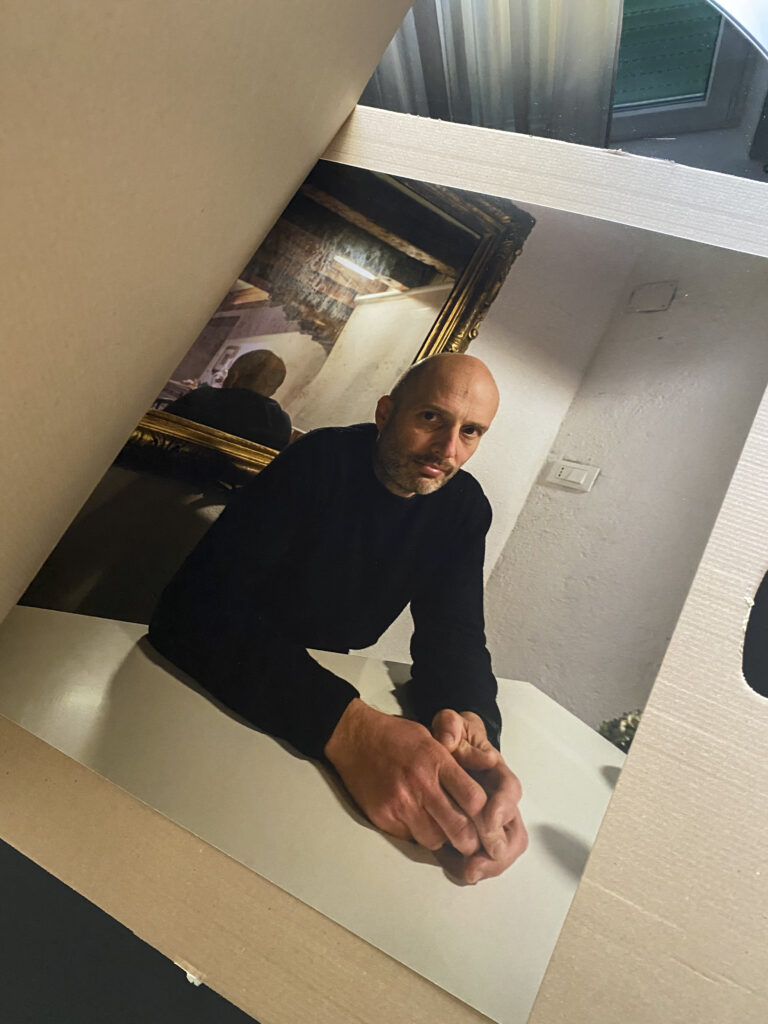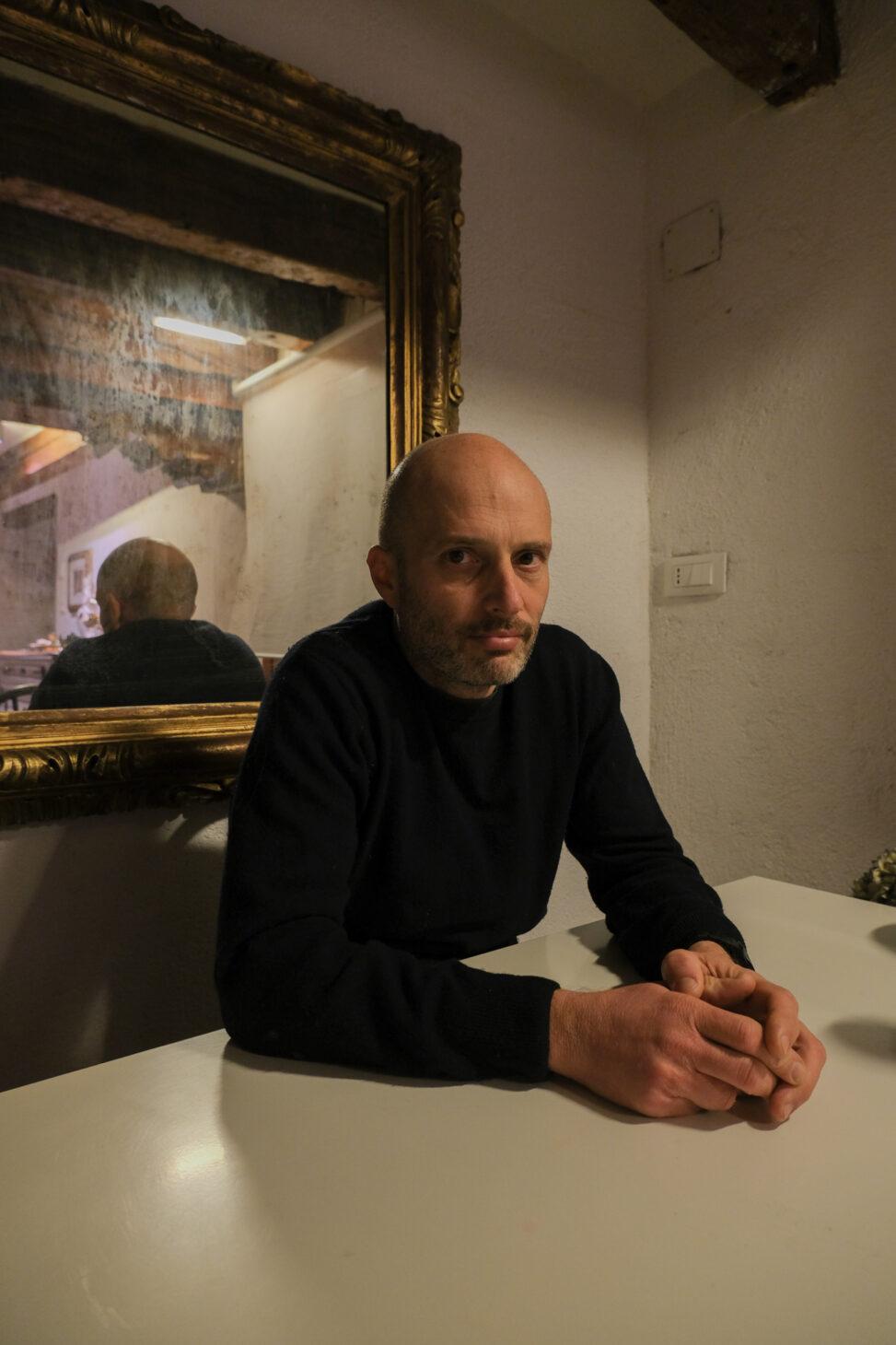To commemorate the International Day Against Homophobia, Biphobia, and Transphobia, Arcigay Viterbo has organized a photo exhibition called “I AM” to showcase the voices and stories of the LGBTQIA+ community. The photographs will be displayed at Bistrot del Teatro in Viterbo, Italy, from May 17th to May 22nd, 2022.
I am grateful for the chance to exhibit a photo of my dear friend Maximilian alongside a text where he shares his experience.

English Version
” During my childhood and adolescence, in Naples in the 70s and 80s, I suffered episodes of homophobia, but they weren’t crucial.
They bullied me about my attitude and the fact that I wasn’t interested in girls. At school, I heard continuous clamour alternating with homophobic jokes. I was also uncomfortable because I didn’t have clear ideas about my sexual impulses and I hid everything behind my extreme shyness. I reacted with an incredible detachment, almost unnatural and a certain ostentatious snobbery. My family’s social position allowed it. I know it wasn’t right, but then it was my only weapon and I made vast use of it, but at the same time, I felt a sense of exclusion and violence.
I put this feeling away and dedicated myself to what I liked best: gardening, clothing, reading, theatre, and the study of languages. In this way, my world, together with my solitude, seemed more like a resource than an inflicted choice.There was an episode, however, that was relevant both to my life and to the life of a gay man. It was the 90s and I was a happy university student engaged in studying and openly homosexual (among other things I was a volunteer at Arcigay).
For a series of reasons beyond my control, I found myself suddenly called up for military service.
The terms for conscientious objection had also expired, so I found myself suddenly leaving for the famous three days, in a barracks in Bari.
I immediately had the perception that in that context I would have suffered episodes of verbal and physical violence.
I therefore immediately appealed to article 41 paragraph b of Presidential Decree 1008/85 through the Arcigay legal office. The article (now no longer in force) provided for sexual inversion as a reason for exemption. More specifically: not that I, as a homosexual subject, didn’t feel able to face the draft, but it was the Italian Army that was not ready to welcome gays as it did not ensure adequate protection for them within the institution.
In those years there had been numerous suicides of homosexuals due to episodes of hazing. Other European armies ensured greater protection through separate dormitories, stricter control of homophobic behaviour or assigned gay office jobs, which the Italian army did not contemplate.
However, what happened later was truly paradoxical: following my exemption from military service, the Ministry of Defense sent my confidential documentation to the Ministry of Transport, which sent me an official communication invalidating my Driving License, with the following motivation: personality disorder and documented homosexuality (all reported on an official document). The letter arrived at home and shocked me and especially my father.
Later I had to undergo an embarrassing medical examination by a Ministry Commission which, not knowing which exam to undergo, gave me a simple eye exam and a sort of colour recognition exam, through the vision of balls of wool. So I got my license back. I appealed and won.Today I don’t easily remember the homophobic episodes suffered and I think of those who are less fortunate than me, of those who unfortunately live in difficult social contexts, of those who are not self-confident, of those who have not been supported by their families, of those who have a single imposed road and has no alternatives, of those who get to make drastic choices.
Certainly, in these years, there is greater acceptance and there is more dialogue about it. At the same time, however, homophobia, in various forms, still rules.
I, therefore, believe that we have to give an input, not necessarily waiting for the acceptance of others, but pointing our way: there will be those who will follow us, some not, some just with a look, and this, together with surrounding ourselves with affection and pleasant contexts, will be enough and set us free.”
Original (Italian Version)
” Durante la mia infanzia e adolescenza, in una Napoli anni ‘70 e ‘80, ho subìto episodi di omofobia, ma non sono stati determinanti.
Mi prendevano in giro per i miei atteggiamenti e per il fatto che non stavo dietro alle ragazze. A scuola udivo un continuo vocìo alternato a battute omofobe. Io ero a disagio anche perché non avevo le idee chiare sulle mie pulsioni sessuali e celavo tutto dietro la mia estrema timidezza. Reagivo con un incredibile distacco, quasi innaturale ed un certo ostentato snobismo: la posizione sociale della mia famiglia me lo consentiva, ora so che non era giusto, ma allora era la mia unica arma e ne facevo largo uso, però allo stesso tempo, sentivo un senso di esclusione e violenza.
Ma lo mettevo via e mi dedicavo a ciò che più mi piaceva: giardinaggio, abbigliamento, lettura, teatro, studio delle lingue, ed il mio mondo, insieme alla mia solitudine mi sembrava più una risorsa che una scelta imposta.
C’è stato un episodio che però è stato rilevante sia per la mia vita, che in assoluto per la vita di un gay. Erano gli anni ’90 ed ero un felice studente universitario impegnato nello studio ed omosessuale dichiarato (tra l’altro facevo volontariato all’Arcigay).
Per una serie di motivi non dipendenti da me, mi trovai ad essere chiamato improvvisamente alla leva militare.
Erano scaduti anche i termini per l’obiezione di coscienza, mi trovai quindi a partire improvvisamente per i famosi tre giorni, in una caserma di Bari.
Ho avuto subito la percezione che in quel contesto avrei subìto episodi di violenza verbale e fisica.
Feci subito ricorso quindi all’articolo 41 comma b del DPR 1008/85 tramite l’ufficio legale dell’Arcigay. L’articolo (oggi non più in vigore) prevedeva l’inversione sessuale quale motivo di esonero. Specifico meglio: non che io, in quanto soggetto omosessuale non mi sentissi in in grado di affrontare la leva, ma era l’Esercito Italiano che non era pronto ad accogliere i gay in quanto non assicurava una protezione adeguata agli stessi all’interno dell’istituzione. Proprio in quegli anni c’erano stati numerosi suicidi di omosessuali dovuti ad episodi di nonnismo. Altri eserciti europei assicuravano una protezione maggiore attraverso camerate separate, un controllo più severo dei comportamenti omofobi o assegnavano ai gay lavori di ufficio, cosa che l’esercito italiano non contemplava.
Ciò che però accadde in seguito fu davvero paradossale: in seguito all’esonero dal servizio militare, il Ministero della Difesa inviò la mia documentazione riservata al Ministero dei Trasporti, il quale mi inviò una comunicazione ufficiale con la quale rendeva invalida la mia Patente di Guida, con la seguente motivazione: disturbo della personalità e documentata Omosessualità (tutto ciò riportato su un documento ufficiale). La lettera arrivò a casa e sconvolse me e soprattutto mio padre.
In seguito mi dovetti sottoporre ad una imbarazzante visita medica di una Commissione del Ministero che, non sapendo a che esame sottopormi, mi fece un semplice esame della vista ed una sorta di esame di riconoscimento di colori, attraverso la visione di dei gomitoli di lana. Riottenni così la patente. Feci ricorso legale e vinsi.
Oggi non ricordo facilmente gli episodi omofobi subìti e penso a chi è meno fortunato di me, a chi purtroppo vive in contesti sociali difficili, a chi non è sicuro di sé, a chi non è stato sostenuto dalla famiglia, a chi ha un’unica strada imposta e non ha alternative, a chi arriva a fare scelte drastiche. Certo in questi anni c’è maggiore accettazione e se ne parla di più. Allo stesso tempo però l’omofobia, in svariate forme, impera. Io credo quindi che un input lo dobbiamo dare noi, non aspettare necessariamente l’accettazione degli altri, ma indicare la nostra via: ci sarà chi ci seguirà, chi no, chi solo con lo sguardo, e questo, insieme al circondarsi di affetti e contesti piacevoli, sarà sufficiente e ci renderà liberi.”


